
Apr 17, 2024
In a first for Ukraine, in-home childcare workers including nannies and babysitters organized and then elected domestic worker Tetiana Lauhina to head their new labor organization, Union of Home Staff (UHS).
“[My colleagues] are amazingly hard-working and well-educated. I want all of them to be recognized as workers and officially protected,” says Lauhina in a video interview.
The Union of Home Staff (UHS), formed by 17 domestic worker activists, will vigorously advocate with Ukraine’s lawmakers and government to ensure protections for domestic workers and formalization as workers under the country’s labor law.
As an outgrowth of nongovernmental organization Union of Home Staff (UHS), the new union will continue to use its allied organization’s name and acronym, UHS, expanding its services as an information hub and community center, including for its 1,800 Facebook members.
Ukraine’s first nationwide survey of domestic workers last year found that working without contracts and formal recognition had left most survey respondents victims of low pay, wage theft, confusion about employment status, exclusion from the country’s pension system and minimal capacity to exercise their right to freedom of association. And, without legal formalization as workers, Ukraine’s domestic workers lack access to care rights and services for themselves and their families—including maternity and child benefits, long-term care services and disability compensation for workers who die or are injured in their employers’ homes.
“[The domestic worker] is not secure and she is nobody for the state,” says Lauhina.
Because women account for three-quarters of the 75.6 million domestic workers globally, domestic worker rights are key to the achievement of equality. On International Women’s Day this year, the ILO issued a new policy brief urging governments and employers’ organizations to ensure that domestic workers have access to labor rights and social protections.
Nongovernmental organization UHS was formed in 2019 with support from Ukraine labor rights nongovernmental organization Labor Initiatives (LI) and the Solidarity Center to raise awareness about labor rights challenges for Ukraine’s care economy workers and support the country’s legislative efforts to formalize domestic work.
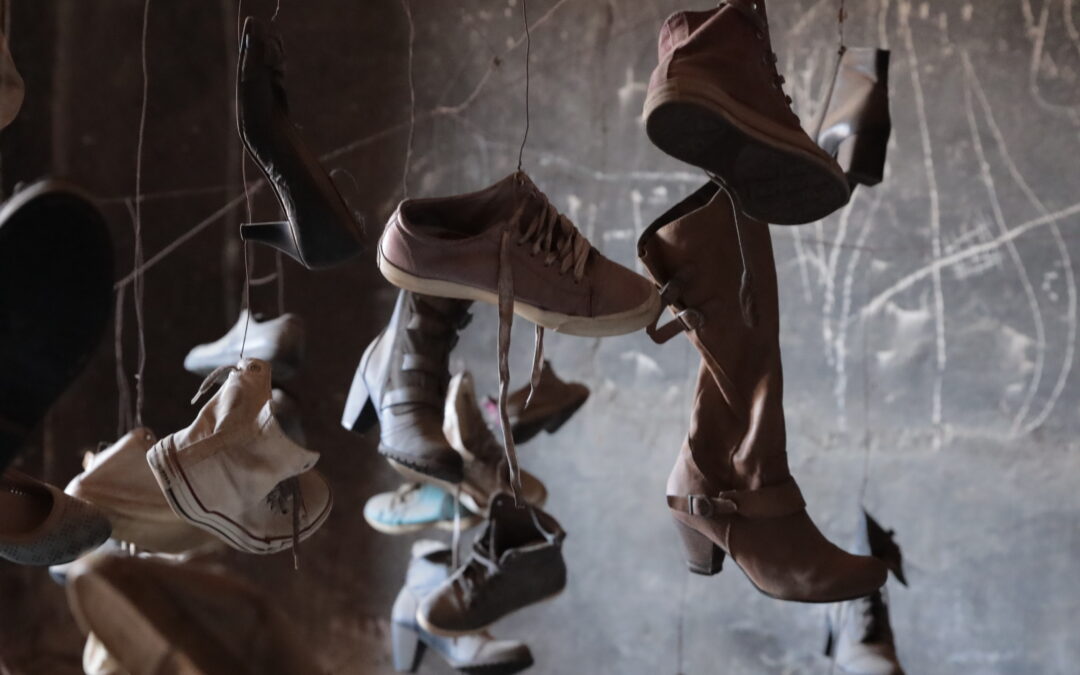
Mar 5, 2024
Kosovo teachers’ union SBASHK (United Union of Education, Science and Culture of Kosovo) is forging a shared school-family-community-policymakers’ agenda to build a multi-tiered mental health support system. This successful effort includes hosting a national conference last month during which attendees agreed to collaborate on solutions going forward and the Ministry of Education committed to increasing the number of school psychologists, addressing national mental health legislation and supporting national mental health awareness campaigns.
The conference—which brought together more than 80 representatives of Kosovo education unions and other union and civil society organizations, education, health care, government, the Kosovo Parliament, media, academia, students and parents’ councils—sought to destigmatize discussion of mental health; examined the latest research and best practices on mental health promotion, prevention and intervention for students, teachers and families; and facilitated opportunities for parents, policymakers, school administrators and teachers to work together on solutions.
“Mental health in Kosovar society is intertwined with a series of factors such as transgenerational trauma from the [1990s Kosovo] war, low salaries that make it difficult to meet vital needs, high unemployment rates, unsafe environments—including cases of sexual assaults—and poor-quality education,” Member of Parliament and University of Pristina Psychology Professor Fitim Uka told conference attendees.
During panel discussions, workshops and breakout sessions, roadblocks to mental health improvement in schools were identified, resulting in a joint appeal for more psychologists in schools, teacher and psychologist training programs, better teacher working conditions, specialized service referrals and advocacy campaigns for reducing mental health stigma, and, above all, for stakeholders to work together.
“This conference proves that, together, we can help for the good of a school and for an even better education,” said SBASHK Chairperson Rrahman Jasharaj.
Solidarity Center Executive Director Shawna Bader-Blau, who also presented, reinforced the call for a shared school, family, community and policymakers’ agenda.
“We’re all in this together, to help our children succeed and help our schools succeed,” she said.
During the 1998-1999 Kosovo war, SBASHK played a vital role in preserving education services. Today SBASHK advocates for better working conditions and fair salaries, safer schools and professional growth opportunities for teachers. A five-week 2022 teachers’ strike for a living wage in response to COVID pandemic and Ukraine war-related inflation earned teachers a significant salary increase, but regional economic challenges continue to threaten teachers’ well-being.
The February 21 and 22 Pristina conference, supported by the Solidarity Center, united stakeholders dedicated to enhancing mental health support in schools including SBASHK, the Ministry of Education, Science, Technology and Innovation (MESTI), the Ministry of Health (MoH), the Parliamentary Committee on Education, the Union of Independent Trade Unions of Kosovo (BSPK), the European Trade Union Committee for Education (ETUCE), Slovenia Education Union (SVIZ), the Education Unions of Albania (SPASH and FSASH), Union of Education, Science and Culture North Macedonia (SONK), the Association of Municipalities, the Municipal Directorate of Education (MDE), the Council of Parents (KP), the Council of Youth (KYC), the Chamber of Doctors, the Chamber of Nurses, the Department of the Psychology/University of Pristina (DP), Kosovo Education Center (KEC), the Kosovo EdGuard Institute and the Kosovo Association of Independent Journalists (AGK).
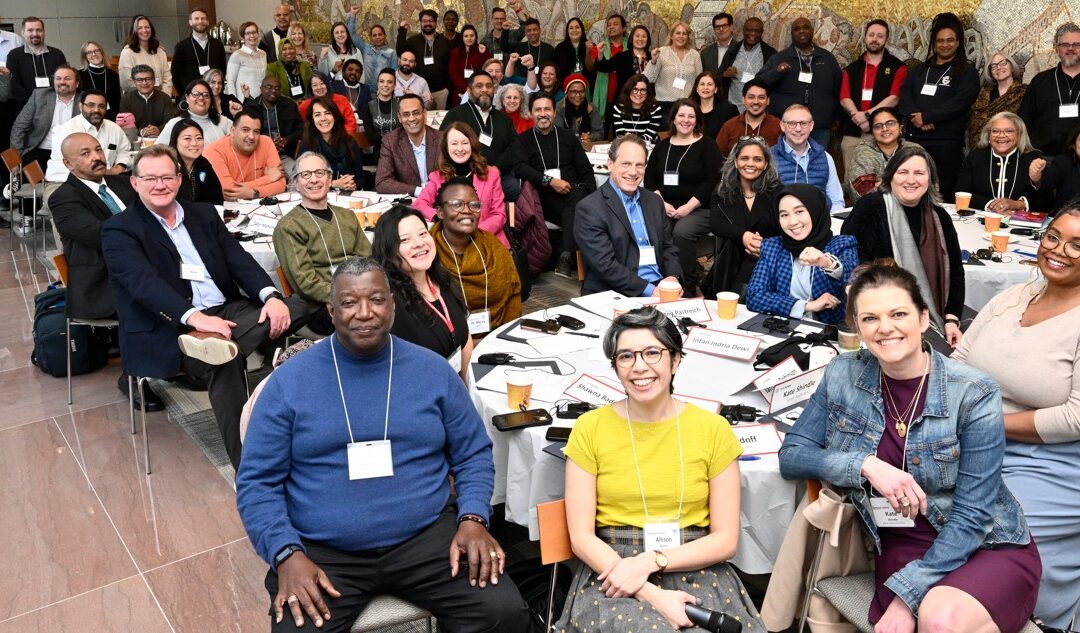
Feb 16, 2024
Dozens of union leaders from around the world who are working to advance democracy in communities and workplaces convened last week in Washington, D.C., to discuss the essential role of unions in leading social change and addressing multiple global crises, including strengthening democracy through the exercise and advancement of worker rights.
As part of the Global Labor Leadership Initiative (GLLI), a Solidarity Center partnership with the Worker Institute at Cornell, 22 union leaders and allies from 17 countries spent two days discussing movement building, the platform economy and strategies to tackle in-country and mutual challenges affecting working people, often in the face of brutal conditions. They then joined more than 70 U.S. and Canadian labor and justice leaders for a two-day event, “Meeting the Moment: How Can Unions Maximize Impact and Power in a Time of Increasing Polarization and Change?” where they shared strategies on how unions can step up efforts to defend and promote worker rights.
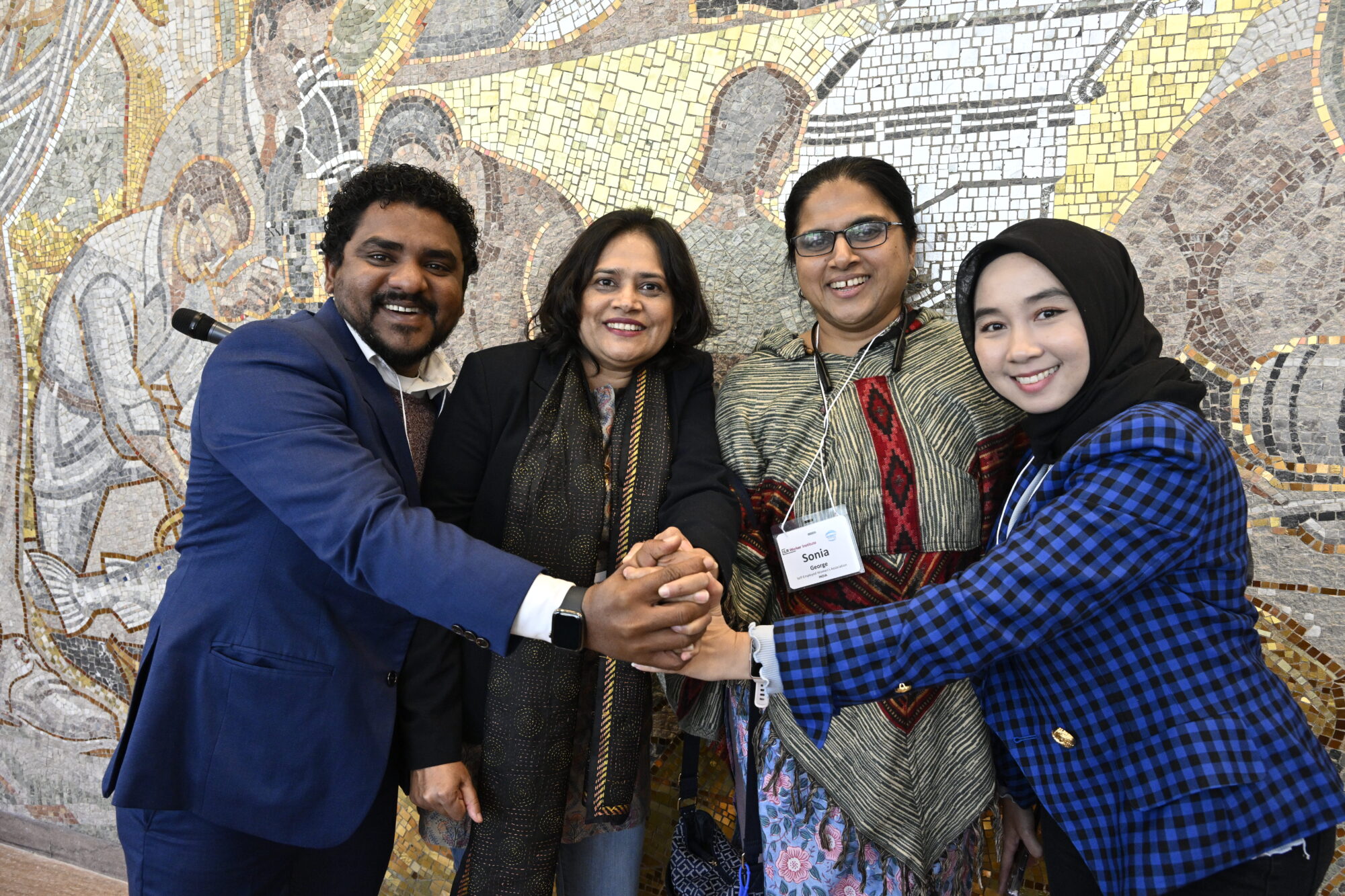
Global Labor Leadership Initiative (GLLI) participants Mauroof Zakir, Tourism Employees Association of Maldives (TEAM) General Secretary and Maldives Trade Union Council President; Nazma Akter, Sommilito Garments Sramik Federation (SGSF) President and founder (Bangladesh); Sonia George, Self-Employed Women’s Association (SEWA) General Secretary; and Intan Indria Dewi, SPN (garment and textile trade union federation) Banten Provincial Chairperson (Indonesia). Photo: Kaveh Sardari
“Democracy exists [only] where workers can be heard,” said Maicon Michel Vasconcelos da Silva, who spoke at the panel event and who serves as secretary of international relations of the Brazil National Confederation of Metalworkers (CNM).
Overwhelming evidence shows that democracy begins at work—in particular, where independent unions provide individuals with the opportunity to elect and be leaders, and join in common cause for better wages, benefits and working hours. Organized labor also holds politicians accountable. In recent years, labor lawyers pushed for justice following Brazil’s deadliest—and entirely preventable—mining disaster. An aviation union in Ukraine exposed rampant corruption in the terminal. And in Colombia, the labor movement shut down the country’s largest port to reach a landmark agreement from the government to live up to its promises to invest in a long-neglected and majority Black city.
Meanwhile, democracy enables workers and their unions to flourish and, as it is increasingly threatened around the world, democracy also depends on working people and their organizations to keep it resilient, said panel speakers and participants, emphasizing unions’ unique role and capacity to push back on unjust and undemocratic forces.
“Unionism and unionizing should really put all of its energy behind democracy,” said Sergio Guerrero in a separate interview. Guerrero, a platform worker in Mexico and general secretary of the National Union of Workers by Application (UNTA), added: “We can’t have a democratic society without unionized workers.”
Yet across every region of the world, “the global cost-of living crisis has been met with a crackdown on the rights of working people,” according to the 2023 International Trade Union Confederation (ITUC) Global Rights Index.”
“Organizing on issues of democracy, of human rights, of preservation of democratic procedure is something I think is essential for us as a union,” said Čedanka Andrić, president of the Serbia Trade Union Confederation Nezavisnost (Independence), who spoke to the Solidarity Center between sessions.
A key takeaway, said many participants, is that democracy cannot be taken for granted.
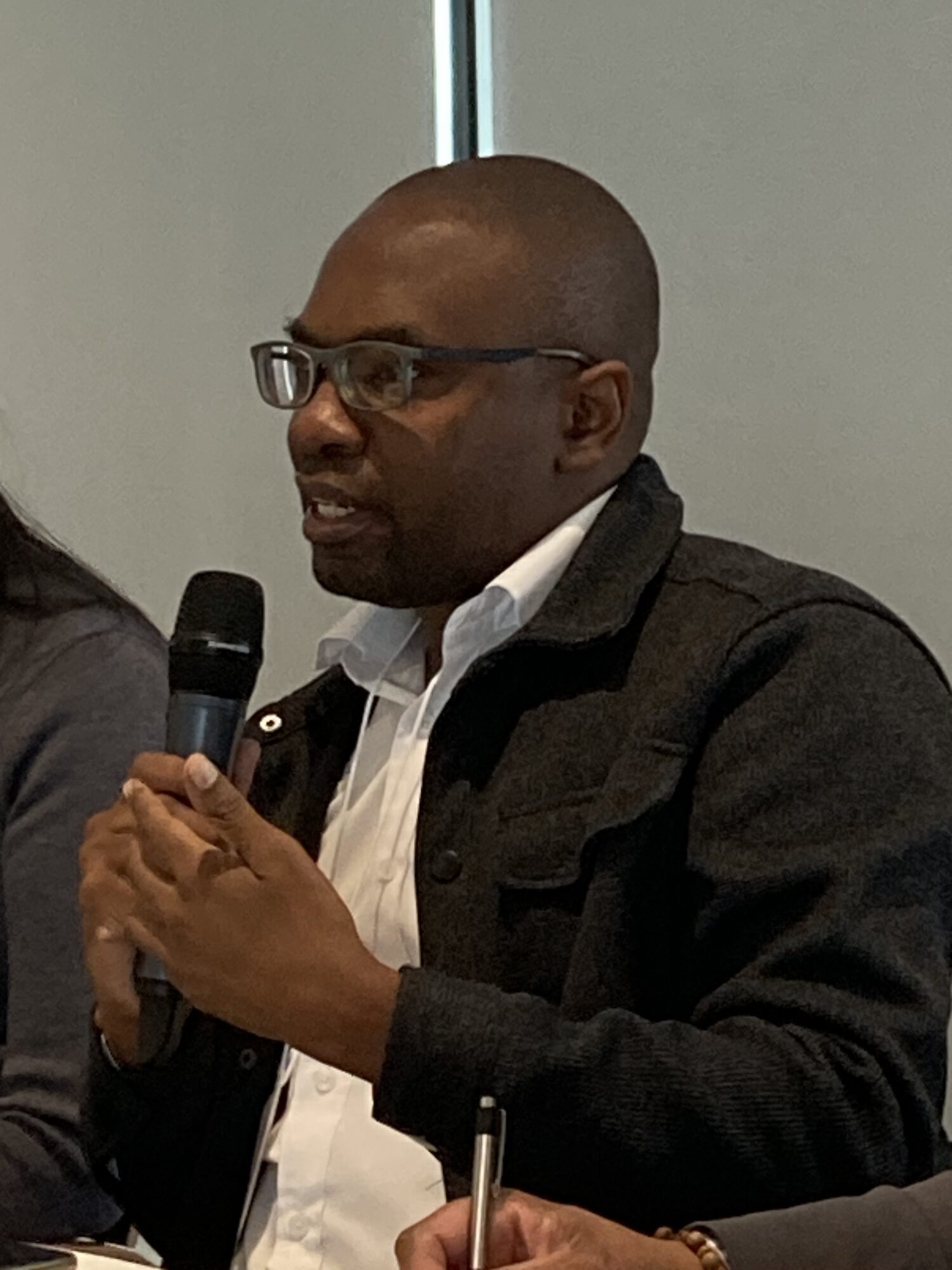
“No one is insulated from dictatorship. No one is safe,” said Peter Mutasa, who had to flee for his life following a violent crackdown on Zimbabwe unions. Photo: Kaveh Sardari
“We learned that the rights won by those who fought before us are transient,” warned Peter Mutasa, chair of the Crisis in Zimbabwe Coalition. Mutasa, former president of the Zimbabwe Congress of Trade Unions (ZCTU), had to flee for his life in 2020 following a violent crackdown on Zimbabwe unions and their leaders that began in 2018.
“No one is insulated from dictatorship. No one is safe,” he said.
The panel event concluded the 2024 GLLI convening. Organized by the Solidarity Center in coordination with Cornell’s ILR Worker Institute, GLLI provides participants with solidarity and skills-building opportunities so they can help build a dynamic, powerful and inclusive labor movement that can transform society and the economy so that it works for workers.
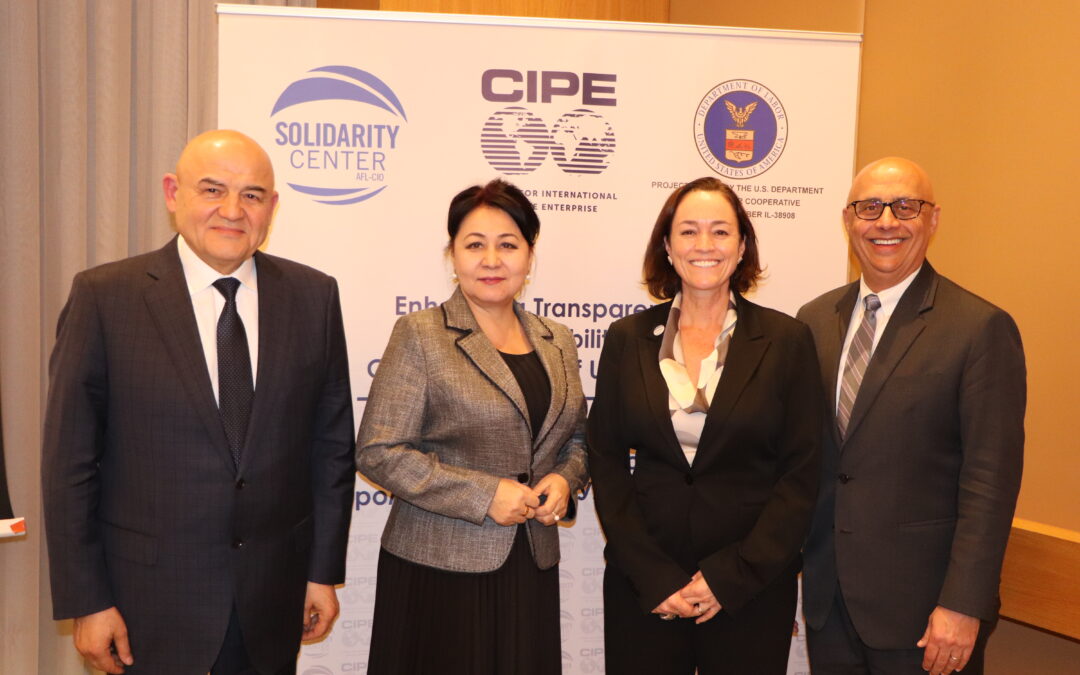
Jan 8, 2024
A groundbreaking cooperative agreement seeking to improve working conditions and prevent forced labor was signed this week for workers, ‘at all stages of cotton and textile production in Uzbekistan.’ Agreement signatories include U.S.-based Center for International Private Enterprise (CIPE), employers’ Association of Cotton-Textile Clusters of Uzbekistan, the Solidarity Center and the Uzbekistan Ministry of Employment.
The two-year memorandum of cooperation is the cornerstone of a new CIPE-Solidarity Center project that was launched at a public event in Tashkent in November. By meeting the sector’s need for an effective reporting and grievance remedy system, and providing an education and incentive system supportive to compliance, the project seeks to build on a 15-year effort that successfully eradicated forced labor in Uzbekistan’s cotton supply chain.
The “Enhancing Transparency and Accountability in the Cotton Industry of Uzbekistan” project—which will be implemented by CIPE and the Solidarity Center through activities laid out in the agreement’s accompanying action plan—is funded by the U.S. Department of Labor.
“The Solidarity Center looks forward to working with CIPE and the Cluster Association to support development of a cotton industry in Uzbekistan that is recognized and rewarded in the global marketplace for upholding labor standards at the highest levels,” said Solidarity Center Executive Director Shawna Bader-Blau at the program launch.
Project goals include to expand stakeholder dialogue to promote transparent market and management standards and employee-oriented accountability systems; establish trust and dialogue among cotton purchasers, producers, workers and the government of Uzbekistan; strengthen Uzbekistan’s cotton supply chain workers’ capacity to identify and effectively resolve labor rights violations through tripartite mechanisms and improved dialogue with employers; improve compliance with international labor standards, including freedom of association and corporate governance provisions; and foster cotton industry sustainability in ways that ensure labor rights are respected and protected.
Under the agreement’s accompanying action plan, program activities will include:
- Developing and piloting worker-led grievance and remedy mechanisms grounded in best international practices for supply chain transparency and management;
- Training workers, managers and employers in the cotton industry on fundamental international standards as defined in core conventions of the International Labor Organization;
- Promoting standards of transparency and commitment to labor rights and good corporate governance by creating a dialogue between stakeholders cotton enterprises, global brands, government agencies and worker representatives.
“We believe that our partnership will support the creation of effective management systems and serves to strengthen social protection, improve labor relations based on international standards and create decent and safe working conditions for workers,” said CIPE Managing Director for Programs Abdulwahab Alkebsi at the program launch.
After years of intense policy advocacy and campaigning, led by Uzbek and international civil society, combined with the Uzbek Government’s political will, state-imposed forced labor is no longer used in the cotton harvest. As a result, in March 2022, the Cotton Campaign ended its call for a global boycott of cotton from Uzbekistan and lifted the Uzbek Cotton Pledge.
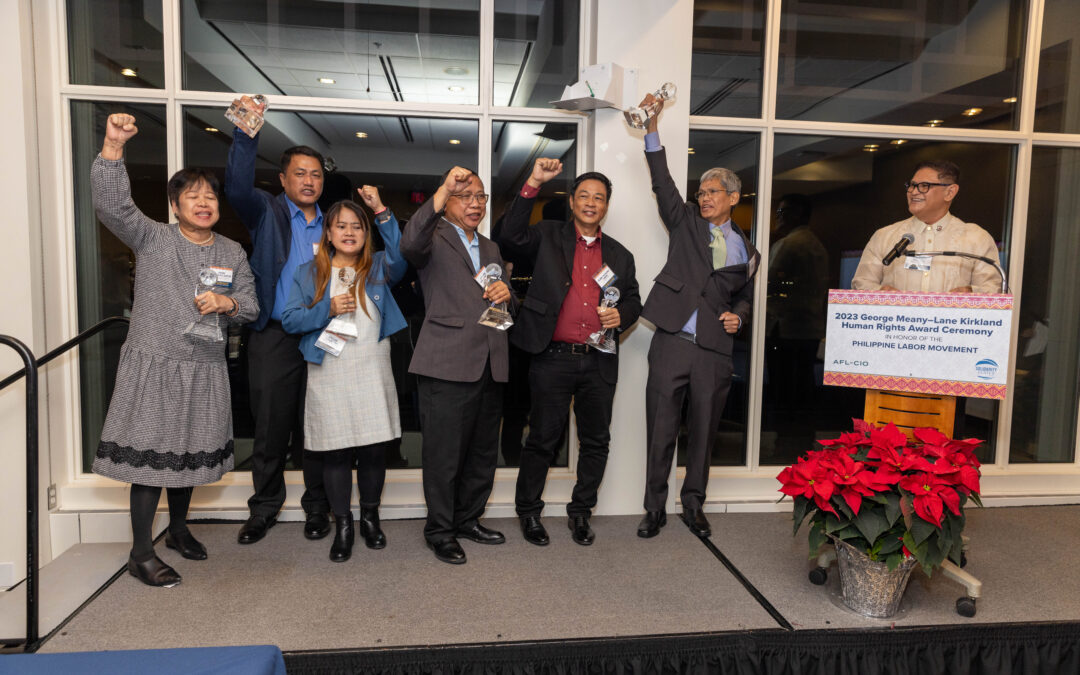
Dec 8, 2023
For their courage and persistence in the face of escalating threats to their own lives, seven delegates representing the Philippine labor movement received the 2023 AFL-CIO George Meany-Lane Kirkland Human Rights Award in a ceremony in Washington, D.C., this week. The award is given annually in recognition of dedication to and effectiveness in highlighting the widespread denial of fundamental human rights at work and in society.
“This award is in recognition of the Philippines labor movement’s resilience, persistence and courage in the face of extreme violence and repression,” said AFL-CIO President Liz Shuler at the event.
More than 70 union members have been killed since 2016, and many more are victims of red-tagging (branding and accusing individuals and/or organizations of being terrorists), illegal firing of union activists and anti-terrorism laws directed at stifling freedom to form unions and bargain.
“The killings are precisely designed to sow fear among workers,” United and Progressive Workers Center (SENTRO) Secretary General Josua Mata told the Solidarity Center.
Persecution has not stopped despite recent changes to the government’s top leadership. Union leader Jude Thaddeus Fernandez, 67, was killed September 29 after a division of the Philippine National Police reportedly entered Fernandez’s home and shot him dead. The murder of Alex Dolorosa—whose role as a union organizer and a paralegal was funded by the Communications Workers of America (CWA)—in April remains uninvestigated like every other extrajudicial killing of a trade unionist in the country.
Workers who are organizing and conducting other union business in the Philippines seek only to build a decent society and life for their families, Trade Union Congress of the Philippines (TUCP) Vice President Luis Corral told the Solidarity Center.
“We are not the enemy,” he said.
In addition to Corral and Mata, the delegation receiving the award for include Alliance of Concerned Teachers (ACT) Secretary General Raymond Basilio; Business Process Outsourcing Industry Employees Network (BIEN) President Mylene Cabalona; Public Services Labor Independent Confederation (PSLINK) President Annie Enriquez Geron; Kilusang Mayo Uno (KMU) Chairman Elmer Labog; and Federation of Free Workers (FFW) President Sonny Matula. The Solidarity Center has a 25-year partnership with the Philippine labor movement, including current support for an organizing campaign for low wage, app-based food delivery workers.
“This recognition fortifies our resolve and validates our efforts under the most challenging of circumstances,” said TUCP President and Philippine Congress House Deputy Speaker Raymond Mendoza when accepting the award, “on behalf of all workers in the Philippines, especially those who gave their lives for labor.”
Previous award recipients include United Nations Special Rapporteur on the rights to freedom of peaceful assembly and of association Maina Kiai and the Tunisian General Labor Union (Union Générale Tunisienne du Travail, UGTT), which also won a shared Nobel Peace Prize for its role in brokering Tunisia’s path to democracy during the Arab uprisings.
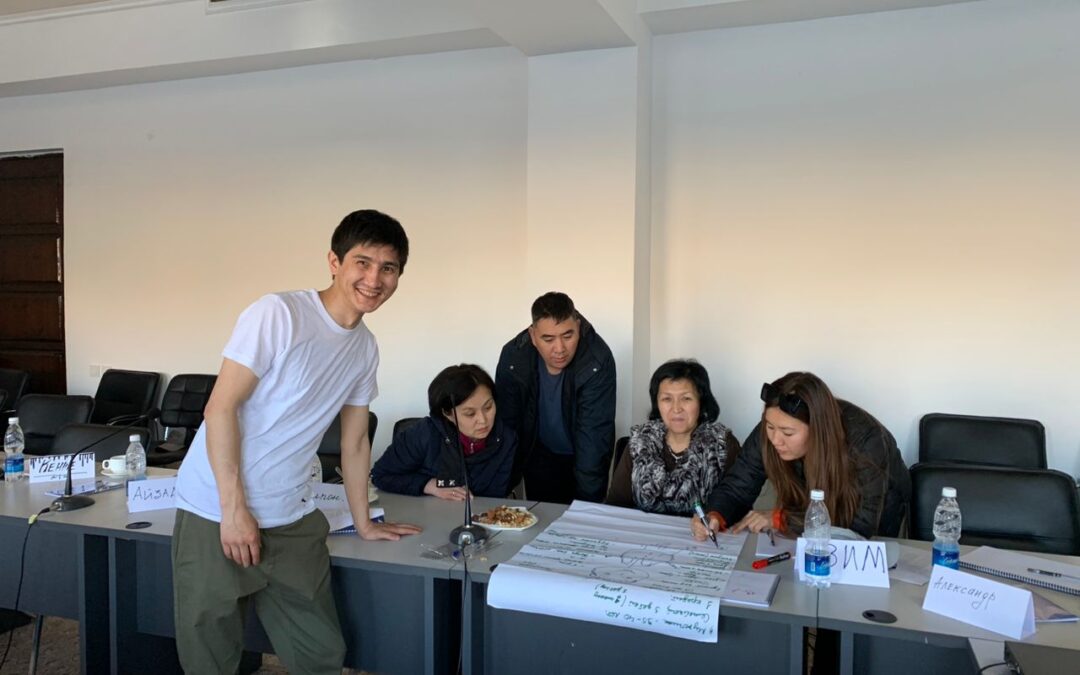
Jun 20, 2023
Recognizing that increased numbers help unions better advocate for worker rights and negotiate wages and working conditions with Kyrgyzstan’s employers and government, 28 union activists joined the Solidarity Center’s Organizing School, a four-part program that began in March. The school drew participants from construction, informal trading, public service, taxi and textile sectors, many of whom are already successfully putting their new skills into practice.
“By emphasizing practical skills, fostering authentic communication and providing ongoing support, this initiative is contributing to a stronger labor movement and empowered organizers who can bring about positive change in their workplaces and communities,” says Solidarity Center Program Officer Elena Rubtsova.
Early successes of the program include establishment of a union savings’ program, “Zymyryk-Invest,” by the union representing construction workers, which has already attracted dozens of new members, and expansion of the taxi drivers’ union, Kabylan, into Kyrgyzstan’s fourth largest city, Karakol, through use of a new, dedicated WhatsApp chat group. Although Kyrgyzstan’s labor law does not specifically protect the rights of workers on digital platforms, it allows self-employed taxi drivers to unite within pre-existing trade unions.
Between training sessions, organizing school participants practiced their new skills, including strategic communications, and benefited from group and Solidarity Center support.
“This training helped me understand that speaking from the heart and using our own words resonates more effectively with others,” says Kabylan President Ulan Cholponbaev.








